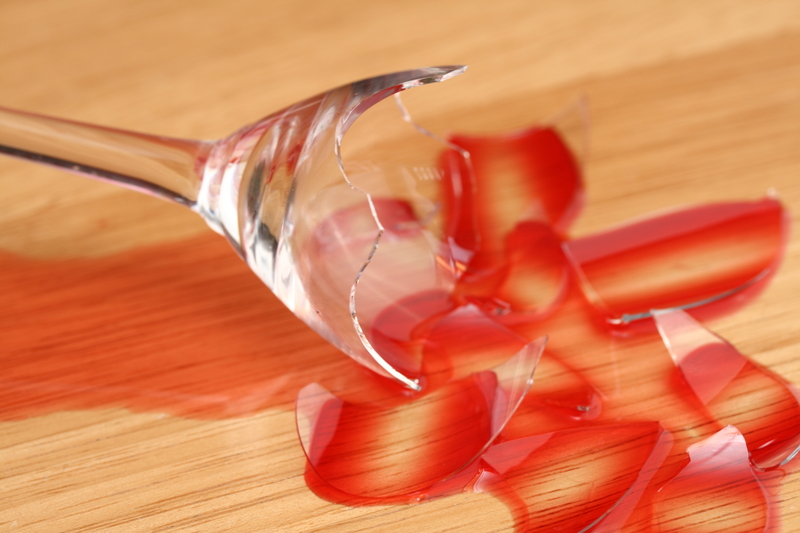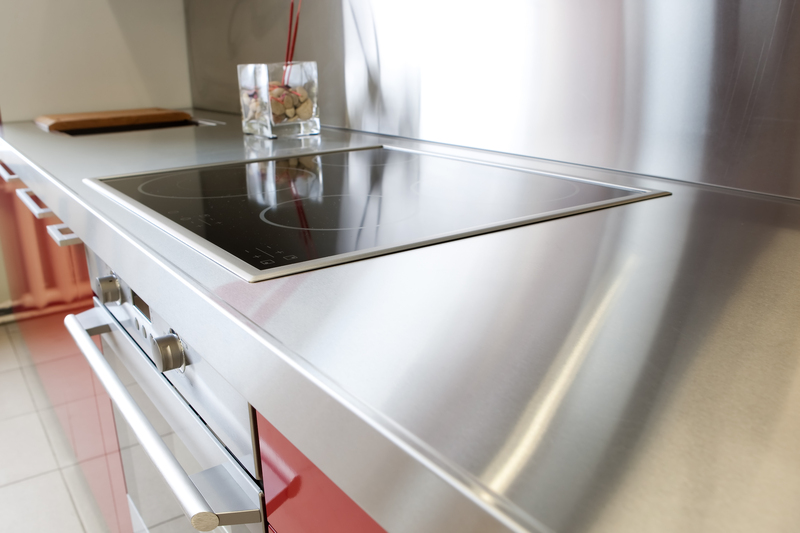Revamp Your Home Environment by Removing Pet Smells
Posted on 24/09/2025
Revamp Your Home Environment by Removing Pet Smells
Sharing your life with pets brings joy, comfort, and an abundance of companionship. However, it often comes with one persistent challenge: pet odors. Even the cleanest pets can leave lingering smells that infiltrate your home's atmosphere, furniture, and carpets. If you're craving a fresh, inviting living space, removing pet smells should be your top priority. In this comprehensive guide, we'll share proven strategies to revamp your home environment and maintain a house that smells clean--no matter how many furry friends you have.
Understanding the Sources of Pet Smells
Before you can effectively eliminate pet odors from your home, it's important to understand why these smells occur in the first place. Recognizing the sources will help you target your cleaning efforts for maximum results.
Common Causes of Pet Odors
- Pet Dander: Dead skin flakes that fall from your pet can accumulate over time and create a musty odor.
- Fur and Hair: Shed fur traps dirt, moisture, and scents in fabrics and carpets.
- Urine and Feces Accidents: Even house-trained pets may have occasional accidents, especially on carpets or upholstery.
- Saliva: Drool and saliva leave invisible residues and can cause smells, especially if your pet grooms itself or rubs on surfaces.
- Paw Oils and Dirt: Pets track in mud, soil, and other debris on their paws, introducing new particles and smells.
- Pet Beds and Litter Boxes: Any object your pet frequently uses can become a source of unpleasant scents.

Effective Strategies for Removing Pet Smells from Your Home
Now that you know where pet smells originate, it's time to tackle them head-on. Here's how you can systematically eliminate pet odors and refresh your living space.
1. Regular Cleaning and Grooming of Pets
- Bathing: Regularly bathe your pets with a gentle, odor-neutralizing shampoo. Consult your veterinarian for appropriate bath frequency.
- Brushing: Brush your pets daily to remove loose fur and reduce dander throughout the house.
- Dental Care: Bad breath contributes to overall pet smells. Brush your pet's teeth often and provide dental chews or toys.
2. Vacuuming and Cleaning Floors
- Vacuum Frequently: Use a vacuum with a HEPA filter to capture dander and fur. Vacuum all carpets, rugs, and hardwood or tile floors at least twice a week.
- Steam Cleaning: Deep-clean carpets and rugs using a pet-safe steam cleaner. This method penetrates fibers and eliminates deeply embedded odors.
- Mopping: For hard floors, mop with a cleaning solution designed to tackle pet smells, or add a bit of white vinegar for natural odor control.
3. Wash or Replace Pet Bedding and Accessories
- Launder Bedding: Wash your pet's bedding, blankets, and plush toys weekly in hot water to kill bacteria and remove smells.
- Clean Collars and Harnesses: These items absorb oils and saliva, so clean or replace them regularly.
- Disinfect Bowls and Litter Boxes: Wash and disinfect food bowls, water dishes, and litter boxes often to prevent lingering odors.
4. Neutralize Odors Instead of Masking Them
Many commercial air fresheners only cover up odors without eradicating them. Focus on products and methods that destroy odor at its source:
- Enzyme Cleaners: These break down organic compounds in pet stains and odors, making them particularly effective for urine and feces removal.
- Baking Soda: Sprinkle baking soda on carpets, let sit for an hour, and vacuum. It absorbs and neutralizes smells naturally.
- Activated Charcoal: Place charcoal bags or deodorizers in rooms to absorb lingering pet odors.
Targeting Specific Areas in Your Home
Pet smells can embed themselves in unexpected places. Addressing these key areas will dramatically improve your home's air quality and ambiance.
Upholstery and Soft Furnishings
- Vacuum Sofas and Chairs: Upholstery fibers trap dander and fur. Use vacuum attachments regularly on sofas, cushions, and curtains.
- Professional Cleaning: Schedule annual professional cleaning for upholstered furniture if needed.
- Use Washable Covers: Machine-wash slipcovers and pillowcases often to remove scent build-up.
Carpets and Rugs
- Spot Clean Stains Immediately: Attend to accidents ASAP with enzyme cleaners to prevent smells from setting.
- Deep Clean Quarterly: Schedule deep cleaning of rugs and carpets at least four times a year when you have pets.
Tiles, Wood, and Hard Surfaces
- Wipe Down Regularly: Clean baseboards, walls, and hard floors with a solution of water and pet-friendly cleaner.
- Address Paw Prints: Have a towel by the door to clean pets' paws after outdoor trips to minimize dirt and odor indoors.
Improving Air Quality to Remove Pet Odors
Eliminating smells isn't just about cleaning surfaces--ambient air quality plays a huge role in whether your home feels fresh or stale.
1. Ventilation
- Open Windows Often: Circulate fresh air daily, even in winter, to help dissipate odors.
- Use Exhaust Fans: Especially in areas where litter boxes or pet beds are located.
2. Air Purifiers
- HEPA Filters: Invest in air purifiers with HEPA and activated carbon filters to trap pet hair, dander, and odors at the source.
3. Natural Deodorizers
- Houseplants: Certain plants, such as peace lilies and spider plants, can help freshen air and absorb impurities. Just be sure your selections are non-toxic to pets.
- Essential Oils (With Caution): Some oils can help neutralize odors, but always check that they are safe for your animals before use.
Preventing Pet Smells: Habits for a Fresh Home
Maintaining a pleasant-smelling home environment with pets is entirely doable with consistency and the right habits. Here are some expert-approved tips:
Consistent Cleanup Schedule
- Daily: Pick up pet hair, spot clean accidents, and open windows for ventilation.
- Weekly: Wash pet bedding, vacuum all areas, and wipe down hard surfaces.
- Monthly: Deep clean carpets, furniture, and drapes to prevent buildup.
Litter Box and Pet Area Management
- Scoop Litter Boxes Daily: Change litter every week and wash the box with mild detergent.
- Designated Pet Spaces: Train your pets to use specific areas, which makes odors easier to manage.
- Outdoor Activities: Encourage pets to relieve themselves outdoors whenever possible.
Diet and Health Considerations
- Healthy Diet: Feeding your pets high-quality food can reduce body odor and waste smells.
- Regular Vet Checkups: Underlying health issues can contribute to excessive odors--annual exams are a wise investment.
DIY Solutions to Remove Pet Smells
If you prefer natural approaches, there are several DIY remedies that are effective and affordable.
White Vinegar Solution
- Mix equal parts white vinegar and water in a spray bottle.
- Use as a deodorizing spritz on hard surfaces or as a mop solution.
- Vinegar neutralizes ammonia odors in pet urine and evaporates odor-free.
Lemon and Baking Soda Paste
- Make a paste with baking soda and fresh lemon juice.
- Apply to hard surfaces, let sit, then wipe clean for a citrus-fresh scent.
Sunlight and Fresh Air
- Let pet bedding air out in the sun regularly. UV rays kill bacteria and freshen fabric.
- Open curtains to allow sunlight into rooms, which can help fight mildew and odors.
When to Seek Professional Help
Sometimes, even with your best efforts, stubborn odors persist. Professional cleaning services use industrial-strength enzymatic cleaners and deodorizers designed specifically for removing pet smells from deep within carpets, upholstery, and hard-to-clean areas. If you've tried everything and the scent lingers, it's wise to invest in a thorough, professional deep clean.

The Benefits of a Fresh, Odor-Free Home
Eliminating pet odors doesn't just improve your living space's scent--it creates a healthier and more welcoming environment for everyone. Enjoy these benefits after implementing these pet odor removal tips:
- Better indoor air quality for your family and guests
- Reduced allergy and asthma triggers thanks to less dander and dust
- Increased comfort and pride in your home's cleanliness
- More positive reactions from guests and visitors
- Longer-lasting furniture, flooring, and decor
Conclusion: Revamp Your Home Environment by Removing Pet Smells
Pets are treasured family members, but unwanted smells shouldn't be part of the package. By prioritizing odor removal and prevention with regular cleaning, targeted products, and healthy habits, you'll create a welcoming, fresh-smelling environment that everyone can enjoy. Use these proven strategies to refresh your living space, eliminate existing pet odors, and keep your home smelling great--now and in the future.
Latest Posts
Eco-Friendly Ways to Clean Your uPVC Window Frames
Revamp Your Home Environment by Removing Pet Smells
Step-by-Step Guide to Perfect Window Cleaning





